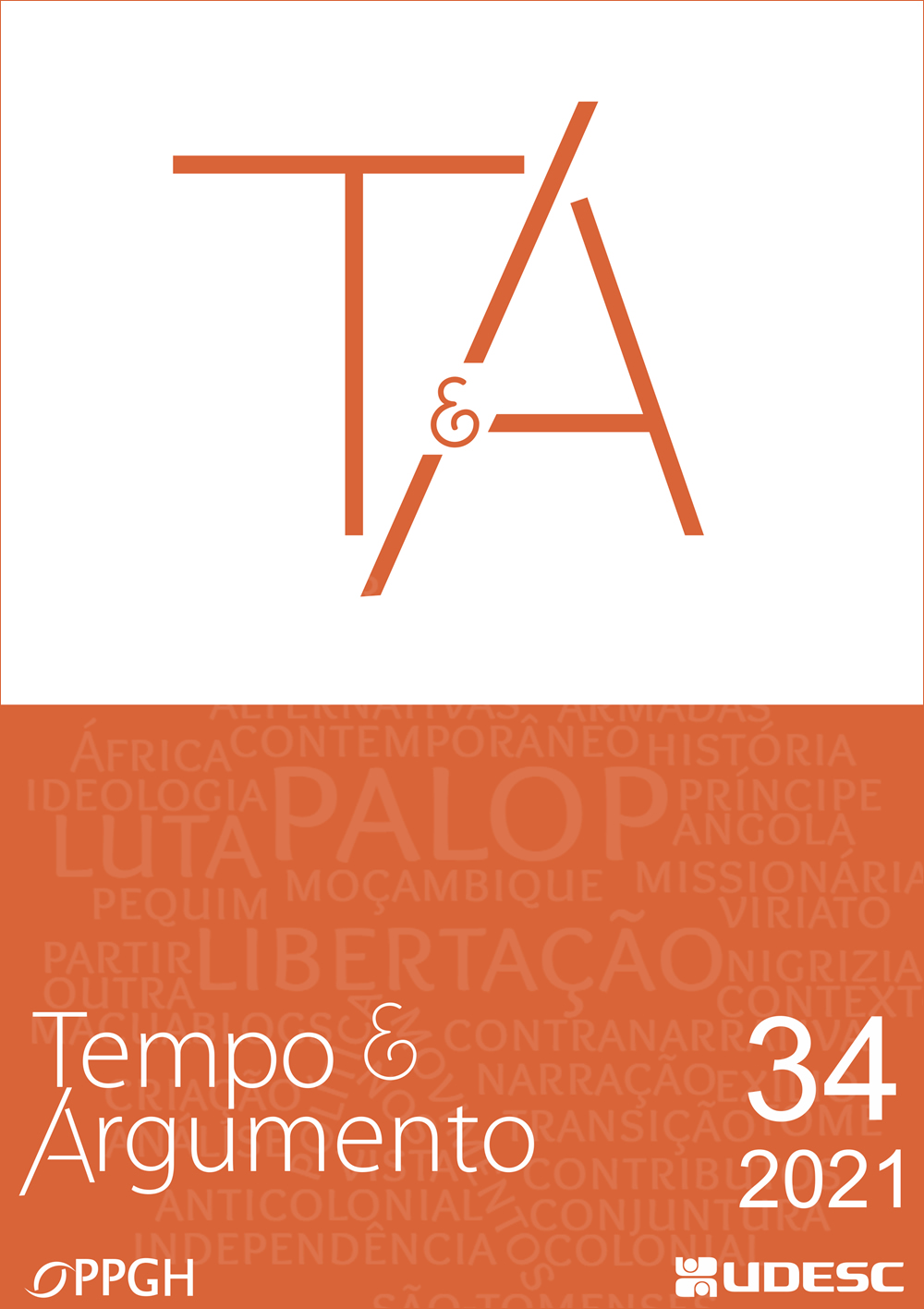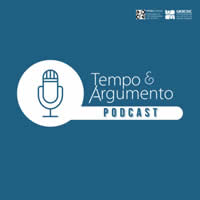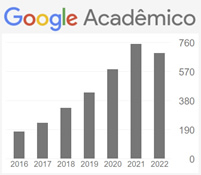Cracks in Presentism: Historical Change in Contemporary Political Protest
DOI:
https://doi.org/10.5965/2175180313342021e0301Abstract
This decade is being marked by a deep public perception of historical change and even as a beginning of a new epoch on a global scale. This paper argues that such a perception has political roots linked to the impact of political protests like June 2013 in Brazil and Occupy Wall Street in the Unitd States. Thus, we analyze the impact of such protests through the narratives and interpretations produced since their occurrence, focusing on books and newspaper articles in these coutries. We intend to contribute to the revision and complexification of the main hypotheses about contemporary historical time linked to the theories of “presentism” and “acceleration”, especially with regard to their conclusions about the current political situation as a setting for the collective experience of the future. Finally, we seek to reflect briefly on the possible responses of historical knowledge to such transformations.
Keywords: demonstrations; social movement; temporality; presentism; june 2013.
Downloads
References
ADAMS, Jason. Occupy Time: technoculture, immediacy and resistance after occupy Wall Street. New York: Palgrave Macmillan, 2014.
ADORNO, Theodor; HORKHEIMER, Max. Dialética do esclarecimento: fragmentos filosóficos. Rio de Janeiro: Jorge Zahar, 1985.
AL HANATI, Yuri. O que restou das Jornadas de Junho? Gazeta do Povo, São Paulo, ano 7, n. 43, p. 3, 23 nov. 2013
ALONSO, Ângela. As teorias dos movimentos sociais: um balanço do debate. Lua Nova, São Paulo, n. 76, p. 49-86, 2009.
ARAUJO, Valdei Lopes. Para além da autoconsciência moderna: a historiografia de Hans Ulrich Gumbrecht. Varia Historia, Belo Horizonte, v. 22, n. 36, jul./dez. 2006.
ARAUJO, Valdei. O direito à história: o(a) historiador(a) como curador(a) de uma experiência histórica socialmente distribuída. In: GUIMARÃES, Géssica; BRUNO, Leonardo; PEREZ, Rodrigo. Conversas sobre o Brasil: ensaios de crítica histórica. Rio de Janeiro: Autografia, 2017. p. 191-216.
BASCHET Jérôme. Défaire la tyrannie du présent: temporalités émergentes et futurs inédits. Paris: La Découverte, 2018.
BERVENAGE, B. História, memória e violência de estado: tempo e justiça. Rio de Janeiro: Milfontes, 2018.
BITTENCOURT, Maria Clara Aquino. As narrativas colaborativas nos protestos de 2013 no Brasil: midiatização do ativismo, espalhamento e convergência. Chasqui. Revista Latinoamericana de Comunicaciónção, Quito, n. 129, ago./nov. 2013.
BLOW, Charles M. Occupy Wall Street Legacy. New York Times, New York, ano 119, n. 7400, p. 6, 13 Sep. 2013.
BLOW, Charles M. New Age of activism. New York Times, New York, ano 120, n. 7400, p. 17, 15 jun. 2014.
BLUMEMBERG, Hans. The legitimacy of the modern age. Massachusetts: The MIT Press, 1983.
BOHLEN, Celestine. Students see new hope in Bias protests. New York Times, New York, ano 120, n. 7400, p. 14, 16 Dec. 2014.
BROWN, Wendy. Introduction: politics out of History. In: POLITICS OF HISTORY. Princeton: Princeton University Press, 2001. p. 77- 101.
BUTLER, Judith. We the people: thoughts on freedom of assembly. In: NOTES TOWARD A PERFORMATIVE THEORY OF ASSEMBLY. London: Harvard University Press, 2015. p. 59.
CASTELLS, Manuel. A sociedade em rede. São Paulo: Paz e Terra, 2005.
COSTA, Henrique. O presente e o futuro das jornadas de Junho. Carta Maior, São Paulo, ano 12, n. 36. p. 12, 11 ago. 2013
DELAHAYE, Ezra. About chronos and kairos. On Agamben’s interpretation of Pauline temporality through Heidegger. International Journal of Philosophy and Theology, London, v. 77, n. 3, p. 85-101, 2016.
EARLE, Ethan. A brief history of occupy Wall Street. New York: Rosa Luxemburg Stiftung, 2012.
EDGES, Chris; SACCO, Joe. Days of destruction, days of revolt. New York: Nation books, 2012.
FELLET, Um ano depois, qual o saldo dos protestos de junho de 2013? BBC News, São Paulo, ano 29, n. 189. p. 17, 13 jun. 2014.
FHOUTINE, Marie. 13 de Junho, o dia que não terminou. Carta Capital, São Paulo, ano 15, n. 73. p. 27, 16 sep. 2013.
FUKUYAMA, Francis. The end of history and the last man. New York: The Free Press, 1992.
GAGE, Beverly. When does a moment turn into a movement? New York Times, New York, ano 120, n. 7560, p. 21, 15 May 2018.
GELDER, Sarah Ruth. This changes everything: occupy Wall Street and the 99% movement. New York: Entertainment Corporation Staff YES! Berrett-Koehler Publishers, Incorporated, 2011.
GERSON, Michael. Conservatism meets Occupy Wall Streets. Washington Post, Washington, ano 97, n. 3.418, p. 9, 14 Oct. 2013.
GITLIN, Todd. Occupy nation: the roots, the spirit, and the promise of occupy Wall Street. New York: Itbooks, 2012.
GOHN, Maria da Glória. Teoria dos movimentos sociais paradigmas clássicos e contemporâneos. São Paulo: Edições Loyola, 1997.
GOLDMACHER, Shane. Ocasio-Cortez Toppled a Giant. Are These N.Y. Democrats Next? New York Times, New York, ano 120, n. 7560, p. 21, 15 May 2018.
GOODWIN, Jeff; JASPER, James; POLLETTA, Francesca.(orgs.). Passionate politics: emotions and social movements. Chicago: University of Chicago Press. 2001
GOODWIN, Jeff; JASPER, James; POLLETA, Fracesca. The retourn of the repressed: the fall and rise of emotions in social movement theory. Mobilizations, Na International Journal, New York, v. 5 n. 1, p. 65-83, 2000.
GOYENS, Tom. Radical Gothan: anarchism in NYC: from Schwab`s saloon to occupy Wall Street. Urbana: University of Illinois Press, 2017.
GUMBRECHT, Hans Ulrich. Our broad present: time and contemporary culture. New York: Columbia University Press, 2014
HABERMAS, Jürgen. New social movements. Telos, New York, n. 49, p. 111-154, 1981
HABERMAS, Jürgen. The postnational constellation: political essays. Cambridge: Polity Press, 2001.
HAIVEN, Max; KHASNABISH, Alex. The radical imagination: social movement research in the age of austerity. London: Zed Books, 2014.
HARTOG, François. A Covid e o tempo: ‘Who is in the driver’s seat? HHMagazine. Humanidades em Rede, Mariana, p. 12-22, 03 fev. 2021.
HARTOG, François. Régimes d’historicité: présentisme et expériences du temps. Paris: Éditions du Seuil, 2003.
HAZEN, Don; LOHAN, Tara; PARRAMORE, Lynn. The 99%: how the occupy Wall Street movement is changing America. San Francisco: AlterNet, 2011.
HUYSSEN, Andreas. Seduzidos pela memória: arquitetura, monumentos, mídia. Rio de Janeiro: Aeroplano, 2000. p. 8-40.
KHATIB, Kate; KILLJOY, Margaret; MCGUIRE, Mike. We are many: reflections on movement strategy: from occupation to liberation. New York: editora AK Press, 2012.
KOSELLECK, Reinhart. Neuzeit’ remarks on the semantics of modern concepts of movement. In: FUTURE PAST: on the semantics of historical time. New York: Columbia University Press, 2004.
LORENZ, Blurred Lines. History, Memory and the Experience of Time. International Journal for History, Culture and Modernity, Amsterdam, v. 2, n. 1, p. 43-63, 2014.
NICOLAZZI Fernando. Muito além das virtudes epistêmicas: o historiador público em um mundo não linear. Revista Maracanan, Rio de Janeiro, n. 18, p. 18-34, jan./jun. 2018.
NOBRE, Marcos. Choque de democracia: razões da revolta. São Paulo: Editora Schwarcz, 2013.
PEREIRA, Mateus H. de Faria; ARAUJO, Valdei Lopes de V. Atualismo: pandemia e historicidades no interminável 2020. Estudos Ibero-Americanos, Porto Alegre, v. 47, n. 1, e39802, 2021. Disponível em https://doi.org/10.15448/1980-864X.2021.1.39802. Acesso em: 09 mar. 2019.
POLLETTA, F. It was like a fever: storytelling in protest and politics. Chicago:
Chicago University Press, 2006.
ROSA, Harmut. Social acceleration: a new theory of modernity. New York: Columbia University Press, 2013.
SOUZA, Francisco Gouvêa de; GAIO, Géssica Guimarães; NICODEMO, Thiago Lima. Uma lágrima sobre a cicatriz: O desmonte da universidade pública como desafio à reflexão histórica (#UERJResiste). Revista Maracanan, Rio de Janeiro, n. 17, p. 71-87, jul./dez. 2017.
STOCKMAN, Farah. ‘Yes, I’m Running as a Socialist.’ Why Candidates Are Embracing the Label in 2018. New York Times, New York, ano 120, n. 7.560, p. 21, 20 Apr. 2018.
TILLY, C. From mobilization to revolution. New York: Newberry Award Records, 1978.
TOLES, Tom. Occupy Wall Street Just Won. New York Times, New York, ano 119, n. 7560, p. 6, 13-15 Jul. 2015
TOURAINE, Alain. La voix et le regard. Paris: Seuil, 1978.
TUFECKI, Zeinep. Twitter and Tear Gaz: the power and fragility of network protest. New Haven: Yale University Press, 2017.
VIANNA, Luiz Werneck. O espírito do tempo e nos. O Estado de São Paulo, São Paulo, p.14-15, 1 maio 2016.
WHITE Mica. The end of the protest: a new playbook for revolution. Toronto: Penguin, 2016.
ŽIŽEK,Slavoj. Pandemia: Covid-19 e a reinvenção do comunismo. São Paulo: Boitempo Editorial, 2020.
THE OCCUPRINT PORTIFOLIO, New York, 2012.
Downloads
Published
How to Cite
Issue
Section
License
Copyright (c) 2021 Tempo e Argumento

This work is licensed under a Creative Commons Attribution-NonCommercial 4.0 International License.
The articles published by the magazine are for free use, destined for educational purposes and not commercial. The copyrights are all granted to the magazine. The articles whose authors are identified represent the expressed opinion of its authors and not the official position of the Tempo e Argumento magazine or of the Postgraduate Program in History of the Universidade do Estado de Santa Catarina.




